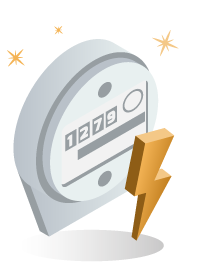New customer ban for Symbio Energy & others

Ofgem has delivered a disabling blow to five suppliers who ignored its initial warnings with regards to smart meter adoption delays in January. Read on as Selectra explains the reason for the regulator’s wrath.
What action has Ofgem taken?
Five suppliers have been given a final order by the watchdog.
The deployment of one of Ofgem’s most deadly weapons means the companies are prohibited from acquiring new customers until they toe the line.
The five suppliers now cut adrift on the rough seas of the competitive energy market are:
- Daligas Limited
- Enstroga Ltd
- Entice Energy Supply Limited
- Euston Energy Ltd (trading as Northumbria Energy)
- Symbio Energy Limited
Why has Ofgem given the suppliers final orders?
The foolhardy five are under an Ofgem blockade until they sign up to the Data Communications Company (DCC).
The DCC is the official data clearing house for the energy sector. When a modern smart meter uploads its information about your energy usage it sends it to the DCC.
Energy suppliers, network operators and energy service companies then use your data for various business purposes.
Membership of the organisation became mandatory for all established suppliers from the 25th of November 2017. New suppliers must join once they have completed Ofgem’s controlled market entry process.
Why does Ofgem want the suppliers to join the DCC?

The roots of these suppliers’ problems stretch back to 2011 and the beginning of the government’s quest to impose smart meters on every home in the UK, whether they wanted one or not.
Smart meters able to send energy consumption data to companies were promoted to the media and the public with promises such as reducing bills, ending fuel poverty and encouraging renewable energy use.
However, the familiar bureaucratic lack of foresight when it comes to the deployment of hi-tech solutions by public officials meant that the first generation of smart meters, known as SMETS1, were hobbled from the start.
The smart meter promoters didn’t see any need to require the devices to use an open standard and provide data in a universal format.
Many suppliers decided to install meters which sent information in a proprietary format that only their systems could use.
The upshot of this was that, when customers with these meters decided to switch to a cheaper supplier they discovered their new company couldn’t use the data from their fancy schmancy new smart meter.
This meant that, as people took advantage of the increasing competition in the energy market, hi-tech smart meters across the country regressed back to become “dumb meters” en masse.
New generation SMETS2 meters were designed to be cross-supplier-compatible from the get-go and upload data via the DCC’s infrastructure.
That still left the problem of all the original version SMETS1 meters sitting in cupboards and under stairs not doing anything very smart at all.
So Ofgem declared all suppliers had to ensure their customers SMETS1 meters were connected up to the DCC by November 2017. The first step towards achieving this was for the companies themselves to become DCC members.
By ignoring the energy watchdog’s January warning to join the data clearing house system the feckless five ensured the SMETS1 meters of any customers choosing to switch to them would go dumb.
Customers would once again have to take and submit meter readings themselves. Not a big deal for most people, but the process could be more challenging for some elderly customers or those living with a disability.
Ofgem said subjecting customers to this experience of smart meters losing most of their IQ points causes “consumer detriment and could undermine consumer confidence in the smart meter programme and the switching process.”
Why does Ofgem want everyone to have a smart meter?
Every household in the nation was supposed to experience the joys of a smart meter installation by 2019 under the government’s initial plan. This target was later put back to 2020.
The latest line from the powers that be is a less ambitious instruction for suppliers to offer every customer a smart meter by the end of 2024.
By February 2020, just over four million smart meters had been installed across the UK.
Meanwhile, the government-promised benefits of smart meters haven’t quite materialized.
As with mobile phones, the limitations of the wireless network the technology uses means many smart meters in rural areas and even in some city dwellings can’t connect to the network, never-mind the DCC.
What’s more, the energy-saving potential of the gadgets has yet to be proven on a large scale.
The optimistic visions of people keeping a close eye on their real-time energy usage displays and then lowering their consumption failed to take into account the realities of human nature, busy lifestyles and short attention spans.
Smart meters may even prove detrimental to consumers in the long run. Some suppliers have been enviously eyeing the notorious surge-pricing model employed by companies like Uber.
The detailed data supplied by smart meters opens the door for customers to be charged more at times of high demand and do away with the straightforward distinction between peak and off-peak hours.
What will Ofgem do next?
Ofgem’s January warning to join the DCC was actually issued to nine companies. They were advised that the watchdog was considering issuing final orders unless they complied with its instructions by the 31st of March.
Three sensible suppliers, Ampower Ltd, Green Supplier Limited and UK National Gas Ltd did what they were told and have been allowed to go on their merry way.
One of the original naughty nine, Better Energy Limited, has also avoided a final order as its domestic customers have all been acquired by PFP Energy and its supply licences are being revoked at the company’s own request on the 20th of March.
The five suppliers still in Ofgem’s sights may face their own involuntary license revocations if they fail to join the DCC by the deadline.
If they follow Ofgem’s instructions, the regulator will lift the ban on taking on new customers and begin revoking the final order.
Whether you’re a customer of one of these five suppliers looking to move to a company with a more certain future or are simply looking around for a better deal, here at Selectra we’ve got you covered.
by J Mccrossan
